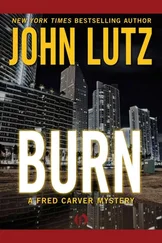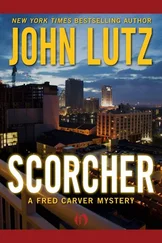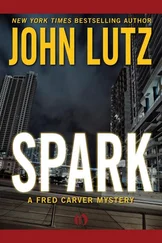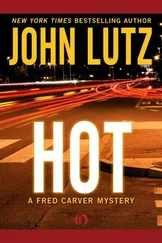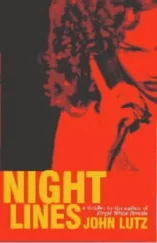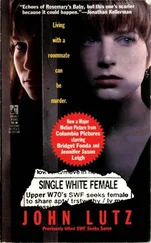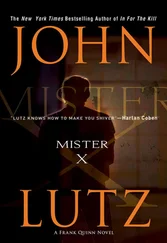John Lutz - Serial
Здесь есть возможность читать онлайн «John Lutz - Serial» весь текст электронной книги совершенно бесплатно (целиком полную версию без сокращений). В некоторых случаях можно слушать аудио, скачать через торрент в формате fb2 и присутствует краткое содержание. Жанр: Триллер, на английском языке. Описание произведения, (предисловие) а так же отзывы посетителей доступны на портале библиотеки ЛибКат.
- Название:Serial
- Автор:
- Жанр:
- Год:неизвестен
- ISBN:нет данных
- Рейтинг книги:4 / 5. Голосов: 1
-
Избранное:Добавить в избранное
- Отзывы:
-
Ваша оценка:
- 80
- 1
- 2
- 3
- 4
- 5
Serial: краткое содержание, описание и аннотация
Предлагаем к чтению аннотацию, описание, краткое содержание или предисловие (зависит от того, что написал сам автор книги «Serial»). Если вы не нашли необходимую информацию о книге — напишите в комментариях, мы постараемся отыскать её.
Serial — читать онлайн бесплатно полную книгу (весь текст) целиком
Ниже представлен текст книги, разбитый по страницам. Система сохранения места последней прочитанной страницы, позволяет с удобством читать онлайн бесплатно книгу «Serial», без необходимости каждый раз заново искать на чём Вы остановились. Поставьте закладку, и сможете в любой момент перейти на страницу, на которой закончили чтение.
Интервал:
Закладка:
“I think it’s time for you to go to work, Feds.”
“Do you insist?”
“Common sense insists.”
“That’s been getting in the way all my life.” He looked into her eyes. “I don’t want you walking around scared.”
“I’m not. I’m walking around trying to stay employed.”
He nodded, glad she was joking about it now.
Someone had entered the aisle down near the opposite end of the library, so they didn’t kiss good-bye, merely touched hands.
As Fedderman walked past the front desk toward the exit, Ms. Culver gave him a disapproving look over the rims of her glasses, as she always did on his arrival or departure. He wondered if she meant it. If Ms. Culver really felt that way about him. It kind of bothered Fedderman to have somebody like that so strongly disapprove of him when they’d only recently met.
It suggested that she knew more about him than he did.
51
Weaver was wearing a cheap plastic raincoat, but it would have to do. It didn’t bother her that she had no umbrella to fend off the steady light rain falling from a dark evening sky. An umbrella would make her more noticeable.
Though the evening was still warm, the careless breeze blowing along the city’s stone canyons sometimes carried a chill. At least Weaver had found a temporarily dry spot, huddled deep in the doorway of an unoccupied building across the street from Jock Sanderson’s walk-up in a bleak brick structure that looked as if it should have been demolished decades ago.
Weaver had read Pearl’s notes and report. She was disgusted by Pearl’s account of her interview with Sanderson.
Jock Sanderson had every reason in the world to kill Judith Blaney. She’d even had a restraining order issued against him. Sure, he had a seemingly ironclad alibi for the time of Blaney’s death, but so what? It was obvious to Weaver that Pearl had been too easy on him.
It was easy to read between the lines. Instead of seeing a wino in a cheap-ass apartment, Pearl had seen an underdog in its pathetic lair. In Weaver’s judgment, this asshole had played Pearl like a piano, made her feel pity so he could little by little ease her over to his side.
And that’s how the interview had ended. With Pearl almost apologizing for disturbing this good citizen in his meager shelter from a heartless society.
Maybe Pearl was right in assuming Sanderson’s innocence so readily. But Weaver thought there was a chance she was wrong, and that he had killed Judith Blaney. Whether he was the Skinner was another question. He might have somehow found out about the severed tongues and used the Skinner as the basis for a copycat crime, made Blaney’s death simply look like another in the string of Skinner murders.
As terrified of Sanderson as Judith Blaney must have been, Weaver figured she deserved more than Pearl’s halfassed conversation with him, and then a perfunctory dismissal of him as a suspect.
Of course it was also true that Weaver saw this as an opportunity to show initiative and make her fellow officers-especially Pearl-seem incompetent. If she went out on her own, secretly, and nailed the Skinner, her career would be made. Renz would see to that.
Pearl had screwed up. There was opportunity here, and Weaver was going to seize it.
She straightened her posture and then stayed still as she saw a dark figure emerge from the apartment building. A man. Wearing a black or dark blue raincoat and a beret or beret-like dark cap. He stutter-stepped down from the apartment to the sidewalk in a quick, easy maneuver that suggested he was familiar with the wet concrete steps.
When he turned and passed beneath a streetlight, Weaver was sure the man was Jock Sanderson.
He picked up his pace, and Weaver had to hurry to keep up. She barely felt the rainwater finding its way beneath her coat collar and trickling down the back of her neck.
Sanderson went down the steps of a subway stop, used a MetroCard, and passed through the turnstiles. Weaver followed.
The platform was crowded, and a train was roaring and screeching in, still traveling fast as its cars winked past waiting passengers. Weaver knew it would slow down and stop in a hurry.
With a loud, protracted squeal, the train did just that. Its sliding doors opened, and passengers streamed out. Some of the people on the platform waited patiently out of the way, while others began easing in through the sides of the doors.
There was a lot of milling about. Weaver looked around and saw that Sanderson was boarding the car behind the one she was about to get on. She turned away as casually as she could and joined the knot of people waiting to board Sanderson’s car.
More passengers than usual streamed from that car, and there was a great deal of pushing and shoving. When Weaver finally fought her way to the door, the car was almost too crowded to get on. She boarded anyway, pressing into the mass of passengers standing and gripping support poles. Several people glared at her. One woman, hugging a cluster of shopping bags to her breast, blithely gave Weaver the finger.
Weaver didn’t mind. What bothered her was that she couldn’t see Sanderson. The train lurched forward, and the mass of pressed humanity shifted in unison. Weaver didn’t like all the bad breath, the body odors mixed with the smells of damp coats and wet hair. She wished to hell that Sanderson had taken a cab. She might be following in a second dry and warm cab. Like in books and movies.
The subway swayed and jiggled though a turn, causing a man to shift position and step on Weaver’s toe. Another man almost lost his footing, leaning against Weaver. He didn’t seem in a rush to straighten up. She decided he was the source of the bad breath.
The train stopped and took on even more passengers. Weaver watched the sliding doors as best she could and didn’t see Sanderson get off. To be sure he was still in the subway car, she leaned sideways and studied the platform through a window as the train pulled away.
There was no Sanderson among the teeming, hurrying riders who had just left the train.
The next stop was Forty-second Street, a busy one. Only a few passengers got off, but many more piled into the cars. Not Weaver’s car, though-it was already crowded to maximum. She watched several people begin to board and then change their minds and drift back and away.
So it went stop after stop. Slowly, the passengers leaving the car began to outnumber those getting on. Weaver caught a reassuring glimpse of Sanderson seated toward the rear of the car.
She lost him at the Thirty-fourth Street stop. He rose from his seat and pushed his way out of the car almost immediately when the doors opened. It took Weaver several seconds to struggle to the nearest door and ease her way out onto the platform.
There were simply too many people massed on the platform for her to keep sight of him. She walked toward the steps leading up to the street, thinking this was as good an exit as any.
There was no sign of Sanderson in the stairwell or on the street.
Weaver glanced again in every direction and then stood there, the cool drizzle on her face, and wondered what to do next.
Then she saw Sanderson across Thirty-fourth Street. He was walking into the breeze, holding an umbrella in front of him as a windbreak as well as protection from the slanting drizzle.
Sanderson had slowed down. Despite the rain, he didn’t seem to be in a rush. He strolled with seeming aimlessness, from time to time stopping to look into shop windows.
Weaver followed, pretending to look into those same windows.
They walked that way for blocks, with Weaver keeping her distance to avoid being noticed. She was good at tailing, and she was sure Sanderson didn’t know he was being followed. He wasn’t exactly being evasive, yet his behavior wasn’t quite normal. There was something about the way he was walking, slightly bent forward, with his umbrella always at precisely the same angle, concentrating intently on something ahead of him.
Читать дальшеИнтервал:
Закладка:
Похожие книги на «Serial»
Представляем Вашему вниманию похожие книги на «Serial» списком для выбора. Мы отобрали схожую по названию и смыслу литературу в надежде предоставить читателям больше вариантов отыскать новые, интересные, ещё непрочитанные произведения.
Обсуждение, отзывы о книге «Serial» и просто собственные мнения читателей. Оставьте ваши комментарии, напишите, что Вы думаете о произведении, его смысле или главных героях. Укажите что конкретно понравилось, а что нет, и почему Вы так считаете.


